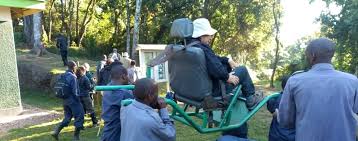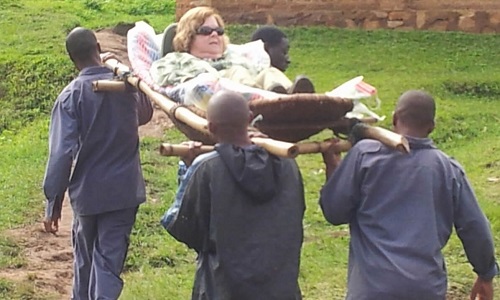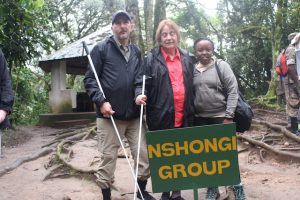Life in Rwanda was getting back to near normal until the Delta variant of the sars-cov-2 virus arrived in June of 2021.
Today is 23rd July 2021 and as I write this, Rwanda is facing the 3rd wave of the covid 19 pandemic because of the highly transmissible Delta variant. Rwanda was forced to reinstate the stricter guidelines to curb the ravaging Delta variant, including stopping public transport, putting curfew from 6pm to 5am. Some districts of the country that are more infected have been placed under total lockdown with no movement allowed except for most essential and no business (except essentials) allowed to operate, and one of these districts is Kigali, the capital city of Rwanda. While inter district travel is forbidden throughout Rwanda.
Luckily, tourism is still open and tourists are allowed to fly into Rwanda and visit Rwanda’s different tourism destinations all of which are open (here are top things to do and see in Rwanda). So you can continue planning your gorilla trek, chimpanzee trek or wildlife safari trip to Akagera Park. But there are guidelines to be followed by all tourism players so as to ensure safety and prevent any farther spread of the virus. You may find the guidelines quite bureaucratic but this is to ensure your safety and that of the locals.
Note that nearly all tourism and hospitability personnel in Rwanda have been vaccinated against covid 19 and these include personnel at parks and other tour destinations, tour guides/drivers, tourist hotels staff.
Planning to visit Rwanda during this latest development of the pandemic and have many questions about what to expect and what guidelines you are to go through? We at Nature Trails East Africa have so far organized two birding trips in Rwanda during this pandemic time and below I shall take you through the guidelines and processes tourists go through, plus also answer some frequently asked questions:
How to prepare before traveling to Rwanda?
1. Take a covid test
You are required to take a covid 19 PCR test, and have a negative result within 72 hours (3 days) to the time of arrival in Rwanda. Note that the 72 hours is counted from the time of collecting your samples.
It does not matter whether you are fully vaccinated, you must take the Covid 19 test and have negative results.
You will print out the results that you shall present on arrival at Kigali International Airport.
2. Book a 24-hour quarantine hotel at your cost
You will undergo another covid 19 test upon arrival in Rwanda and quarantine in a hotel for 24 hours as you wait for your results. Therefore, before traveling to Rwanda you must book a hotel for the 24hrs. There is a list of designated quarantine hotels of different budgets. Book the hotel and receive a confirmation from the hotel which you shall also present on arrival. Here is a list of designated hotels. https://travel.rbc.gov.rw/travel/src/Designated%20Hotels.pdf
You will pay for the hotel at checking in.
3. Fill the Passenger Locator Form
Next, you must fill the Passenger Locator Form before taking your flight to Rwanda. Here is the link to the form: https://travel.rbc.gov.rw/travel/ The Passenger Locator Form is an online portal Rwanda will use to follow you up in case you or someone you are traveling with has developed covid 19 symptoms. You will also use this platform to track your covid 19 test results as they will posted to your registered account. To fill this form, you must have booked your flight, done your test, and booked your quarantine hotel and received the confirmation. You can fill the locator form a few hours to taking the flight.
Arrival at the airport
1. Another mandatory test on arrival at your cost
On arrival at the airport, you will be warmly received by the immigration officers, your covid 19 negative test document & hotel confirmation checked.
You will pay for your covid test which is USD60 that you can pay in cash or using your visa card.
You will then proceed to waiting nurses in nicely set up testing tents where they will collect samples from your throat.
You will be given a printed receipt confirming that your samples have been collected for the test, and the receipt also includes a unique ID number that you will use to check your results by texting a code on the phone, or logging into the passenger locater. You will be guided on how to do this.
After sample collection you will continue to the immigrations’ booths for visa clearance and you continue to the exit.
2. 24 hour Hotel Quarantine
At the exit, you fill find an airport official with a list of all arrivals and their respective quarantine hotels they booked.
Your hotel driver will be waiting, you get into the car and driven to the hotel for your 24 hour quarantine as you wait for your results.
The results come back within 24 hours, and typically by after 8 – 12 hours most travelers have received theirs. You will check for your results after this time by logging into Passenger Locater Form platform or dialing the code on your phone. The hotel will also keep checking for you.
Otherwise you are not allowed to leave your room until your results are back (negative). All meals will be provided in your room.
Once the hotel confirms your negative results you will be free to leave your room and continue with your travels.
3. 7 Days hotel quarantine for passengers coming from Uganda and India.
Rwanda recognizes neighboring Uganda, and India as countries with highest infections of the sars-cov-2 virus (especially the Delta variant) and all travelers coming from these two countries, or have been to these two countries in the last seven days mush undergo a 7 day quarantine time instead of 24 hours. This is to eliminate any possibility of the variant slipping through.
There is another set of designated 7 day quarantine hotels different from the 24 hour. They are listed here https://travel.rbc.gov.rw/travel/
This is also at your own cost.
The 7 day quarantine can take a toll on you. In case you are not ready for it and yet you have to travel to Rwanda, you can transit through another country (say Kenya) and spend a week before continuing to Rwanda. This way you will only do the 24 hours hotel quarantine
4. What happens if I test positive on arrival in Rwanda?
If your results come back positive, you will be picked from the hotel and taken to a health facility where you will be treated.
All treatment is at your own cost.
Once you test negative you will be free to continue with your travels in Rwanda.
Traveling in Rwanda during lockdown
Inter district travel is not permitted, but tourists can travel throughout Rwanda and cross the different districts after attaining a pass/permit issued by the Rwanda Development Board (RDB).
The requirements to get a pass are: a negative covid 19 test done in the last 120 hours, and a confirmation from your destination e.g. hotel booking or activity do in the park.
Visiting the Rwanda parks during the pandemic and lockdown
Rwanda has 4 national parks including Volcanoes National Park, Akagera National Park, Nyungwe National Park and Gishwati – Mukura National Park.
All the above parks are open for tours.
However, each park requires having a negative covid test result of within 72 hours before visiting the park.
The primate parks which are Volcanoes National Park (gorillas, golden monkeys), Nyungwe National Park (chimpanzees and monkeys) & Gishwati – Mukura national park (chimps & monkeys) require a PCR test which takes longer to get results coming back within 24 hours. Therefore plan accordingly.
PCR testing centers in Rwanda can be found in districts of Kigali, Musanze near Volcanoes National Park, and Rubavu district. There is no PCR testing center near Nyungwe National Park
A rapid test is enough to visit Akagera National Park. Rapid test results take only 15 minutes.
Leaving Rwanda
You are required to have a negative PCR test result within 72 hours before your departure flight.


